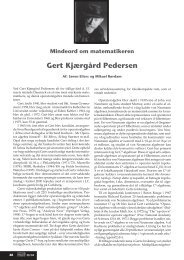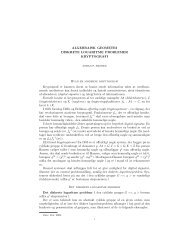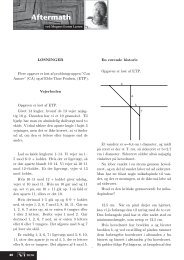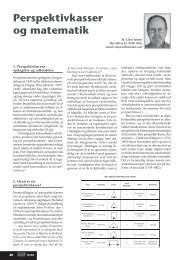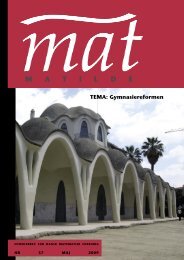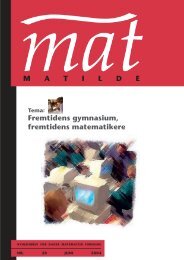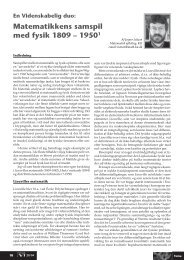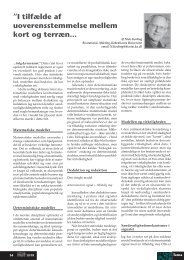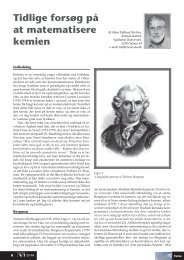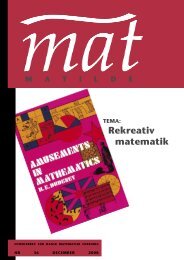TEMA - Matilde - Dansk Matematisk Forening
TEMA - Matilde - Dansk Matematisk Forening
TEMA - Matilde - Dansk Matematisk Forening
Create successful ePaper yourself
Turn your PDF publications into a flip-book with our unique Google optimized e-Paper software.
Interview with Abel prize recipient<br />
Srinivasa Varadhan<br />
Conducted by Martin Raussen (Aalborg, Denmark)<br />
and Christian Skau (Trondheim, Norway)<br />
Oslo, May 21, 2007<br />
This interview has also appeared in the EMS newsletter<br />
Professor Varadhan, first of all I would like to congratulate<br />
you for having been awarded the Abel Prize this<br />
year.<br />
By extension, my congratulations go to the field of probability<br />
and statistics since you are the first recipient<br />
from this area. Incidentally, last year at the International<br />
Congress of Mathematicians in Madrid, Fields medals<br />
were given to mathematicians with expertise in this area<br />
for the first time, as well.<br />
How come that it took so long time before probability<br />
and statistics were recognized so prestigiously, at the<br />
International Congress of Mathematicians last year and<br />
with the Abel Prize this year? Is it pure coincidence that<br />
this happens two years in a row? Could you add some<br />
comments on the development of the relations between<br />
probability and statistics on the one hand and the rest<br />
of mathematics on the other hand?<br />
Probability became a branch of mathematics very recently<br />
in the 1930s after Kolmogorov wrote his book. Until<br />
then it was not really considered as a proper branch of<br />
mathematics. In that sense it has taken some time for<br />
the mathematical community to feel comfortable with<br />
probability the way they are comfortable with number<br />
theory and geometry. Perhaps that is one of the reasons<br />
why it took a lot of time.<br />
In recent years probability has been used in many<br />
areas. Mathematical finance for example uses a lot of<br />
probability. These days, probability has a lot of exposure<br />
and connections with other branches of mathematics have<br />
come up. The most recent example has to do with conformal<br />
invariance for which the Fields medal was given last<br />
year. These connections have brought probability to the<br />
attention of the mathematics community, and the awards<br />
are perhaps a reflection of that.<br />
Career<br />
The next question is about your career. You were born<br />
in Chennai, the capital of Tamil Nadu, on the South-East<br />
coast of India, in 1940. You went to school there and<br />
then to the Presidency College at Madras University. I<br />
would like to ask you about these formative years: What<br />
was the first reason for your interest in mathematical<br />
problems? Did that happen under the influence of your<br />
father, who was a teacher of mathematics? Were there<br />
other people, or were there specific problems that made<br />
you first interested in mathematics?<br />
My father was in fact a teacher of science, not so much<br />
mathematics. In my early school days I was good in<br />
mathematics, which just meant that I could add, subtract<br />
and multiply without making mistakes. Anyway I had<br />
no difficulty with mathematics. At high school I had an<br />
excellent mathematics teacher who asked some of his<br />
better students to come to his house during weekends,<br />
Saturday or Sunday, and give them extra problems to<br />
work on. We thought of these problems just as intellectual<br />
games that we played, it was not like an exam;<br />
it was more for enjoyment. That gave me the idea that<br />
mathematics is something that you can enjoy doing like<br />
playing chess or solving puzzles. That attitude made mathematics<br />
a much more friendly subject, not something to<br />
be afraid of, and that played a role in why I got interested<br />
in mathematics.<br />
After that I went to college for five years. I had excellent<br />
teachers throughout. By the time I graduated with<br />
a master degree in statistics, I had three years of solid<br />
grounding in pure mathematics. My background was<br />
strong when I graduated from College.<br />
Was there a specific reason that you graduated in statistics<br />
rather than in other branches of mathematics?<br />
The option at that time was either to go into mathematics<br />
or into statistics. There was not that much difference<br />
between these two. If you went into mathematics, you<br />
studied pure and applied mathematics; if you went into<br />
statistics, you studied pure mathematics and statistics.<br />
You replaced applied mathematics with statistics; that was<br />
the only difference between the two programs. Looking<br />
back, part of the reason for going into statistics rather then<br />
mathematics, was the perception that if you went into<br />
statistics your job opportunities were better; you could<br />
be employed in the industry and so on. I f you went into<br />
mathematics, you would end up as a school teacher. There<br />
was that perception; I do not know how real it was.<br />
With your degree in statistics it seemed quite natural<br />
that you continued at the Indian Statistical Institute at<br />
Kolkata. There you found yourself quite soon in a group<br />
of bright students that, seemingly without too much<br />
influence from their teachers, started to study new areas<br />
of fundamental mathematics and then applied those to<br />
problems coming from probability theory; with a lot of<br />
success:<br />
You were able to extend certain limit theorems for sto-<br />
33/07<br />
13



